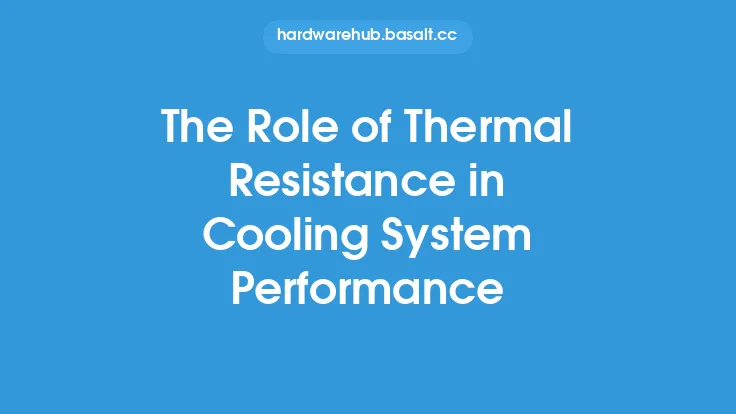High-performance computing (HPC) systems are designed to process vast amounts of data at incredible speeds, but this processing power comes at a cost: heat. As the computational density of these systems increases, so does the amount of heat generated, which can lead to reduced performance, increased power consumption, and even system failure. To mitigate these effects, radiators play a crucial role in HPC cooling systems, working in conjunction with other components to efficiently dissipate heat and maintain optimal operating temperatures.
Introduction to Radiators in HPC Cooling Systems
Radiators are a type of heat exchanger designed to transfer heat from a fluid (usually a liquid coolant) to the surrounding air. In the context of HPC cooling systems, radiators are typically used to cool the hot water or coolant that has absorbed heat from the computational components, such as CPUs, GPUs, and memory modules. The radiator's primary function is to provide a large surface area for heat transfer, allowing the coolant to release its heat energy to the air, which is then dissipated away from the system.
Types of Radiators Used in HPC Cooling Systems
There are several types of radiators used in HPC cooling systems, each with its own strengths and weaknesses. Some common types include:
- Tube-and-fin radiators: These radiators consist of a series of tubes through which the coolant flows, surrounded by a matrix of fins that increase the surface area for heat transfer.
- Plate-and-frame radiators: These radiators use a series of flat plates to separate the coolant from the air, with a frame that holds the plates in place and provides additional structural support.
- Microchannel radiators: These radiators use a series of tiny channels to increase the surface area for heat transfer, allowing for more efficient cooling in a smaller footprint.
Each type of radiator has its own advantages and disadvantages, and the choice of which to use will depend on the specific requirements of the HPC system, including the amount of heat to be dissipated, the available space, and the desired level of cooling performance.
Radiator Design Considerations for HPC Cooling Systems
When designing a radiator for an HPC cooling system, there are several key considerations to keep in mind. These include:
- Heat transfer coefficient: The radiator's ability to transfer heat from the coolant to the air will depend on the heat transfer coefficient, which is influenced by factors such as the surface roughness, material properties, and flow rates.
- Pressure drop: The pressure drop across the radiator will affect the system's overall pumping power and efficiency, so it's essential to minimize pressure drop while maintaining adequate heat transfer.
- Flow rate and velocity: The flow rate and velocity of the coolant through the radiator will impact the heat transfer performance, with higher flow rates and velocities generally resulting in better cooling.
- Airside pressure drop: The pressure drop on the airside of the radiator will also impact the system's overall performance, as it will affect the fan power consumption and noise levels.
By carefully considering these design factors, engineers can create radiators that are optimized for HPC cooling systems, providing efficient and effective heat transfer while minimizing energy consumption and noise levels.
Radiator Materials and Manufacturing Processes
The materials used to construct radiators for HPC cooling systems will depend on the specific requirements of the application, including the operating temperature range, corrosion resistance, and mechanical strength. Common materials used for radiators include:
- Copper: Copper is an excellent heat conductor and is often used for the tubes and fins in tube-and-fin radiators.
- Aluminum: Aluminum is a lightweight, corrosion-resistant material that is often used for the plates and frames in plate-and-frame radiators.
- Stainless steel: Stainless steel is a strong, corrosion-resistant material that is often used for the tubes and fittings in radiators.
The manufacturing process used to create the radiator will also impact its performance and durability, with common processes including:
- Brazing: Brazing is a high-temperature joining process that is often used to assemble the tubes and fins in tube-and-fin radiators.
- Welding: Welding is a joining process that is often used to assemble the plates and frames in plate-and-frame radiators.
- 3D printing: 3D printing is a additive manufacturing process that is being increasingly used to create complex radiator geometries and structures.
Integration with Other Cooling System Components
Radiators are just one component of a larger HPC cooling system, which may include other components such as:
- Pumps: Pumps are used to circulate the coolant through the system, providing the flow rate and pressure required for efficient heat transfer.
- Heat exchangers: Heat exchangers are used to transfer heat from the coolant to a secondary fluid, such as air or water, which is then dissipated away from the system.
- Fans: Fans are used to provide airflow through the radiator, enhancing the heat transfer performance and reducing the pressure drop.
- Control systems: Control systems are used to monitor and regulate the cooling system's performance, adjusting parameters such as flow rate, temperature, and pressure to optimize the cooling performance and minimize energy consumption.
By integrating the radiator with these other components, engineers can create a comprehensive cooling system that is optimized for the specific requirements of the HPC application.
Conclusion
Radiators play a critical role in HPC cooling systems, providing a efficient and effective means of dissipating heat from the computational components. By understanding the different types of radiators, design considerations, materials, and manufacturing processes, engineers can create radiators that are optimized for HPC cooling systems, providing reliable and efficient cooling performance while minimizing energy consumption and noise levels. As the demand for high-performance computing continues to grow, the importance of radiators in HPC cooling systems will only continue to increase, driving innovation and advancements in radiator design and manufacturing.





